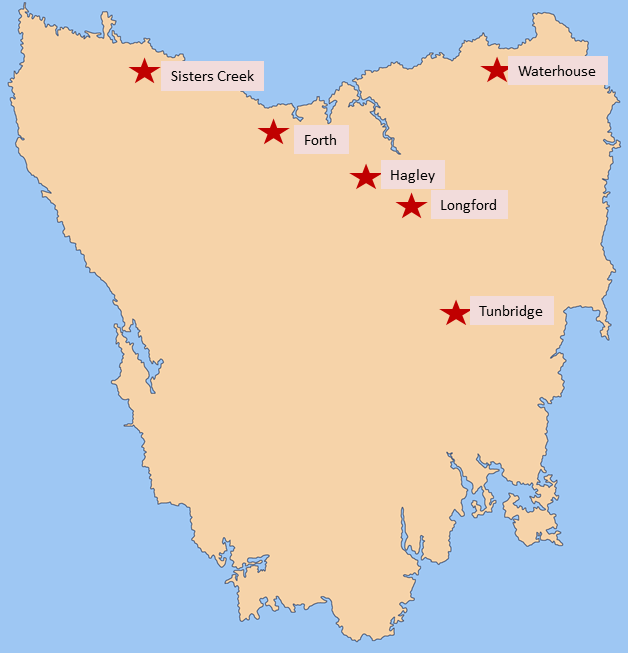Project details
Status: Completed
This project, announced by the Tasmanian Government in 2015, aims to build awareness of the production and environmental benefits of using precision agriculture (PA) technologies.
The target audience for this project is agricultural stakeholders in the supply chain, including farmers, agronomists, field officers, contractors, and agri-business.
Aims of the project
Using mapped data to inform decisions about vari-rate nutrition and vari-rate irrigation techniques, the project aims to not only help boost crop yields, but also reduce fertiliser costs, improve irrigation techniques and provide information to make better farm management decisions.
The project will use six Tasmanian demonstration sites (Sisters Creek, Forth, Hagley, Longford, Waterhouse, Tunbridge) as a means to:
- Raise awareness and increase adoption of PA best practices via implementation of PA methodologies and concepts.
- Identify on-farm variability soils and crops in terms of scale and commercial implication.
- Provide advice on identification of soil constraints and in-season challenges to target appropriate inputs and amelioration techniques for crops in vegetable rotations
- Provide advice to manage and protect land using better targeted, strategic applications of farm inputs
- Offer an avenue for shared experiences, develop leadership and networks
- Increase landholder knowledge in precision land management.
This research will build capacity in the production aspect of farming with precision agriculture techniques, and will encourage an increased awareness of soil constraints and environmental responsibilities in farming.
Farm Demonstration Sites
The project is supporting the application of PA techniques and delivery of PA analysis on six regional case study sites that broadly represent the soils, farm management practices and rotational cropping enterprises relevant to the local area.
The project has established commercial-scale, on-farm case study sites on properties in the Meander Valley, Northern Midlands, North-east, Tunbridge and on the North-west Coast.
The aim is to give farmers, advisors and agri-business partners the opportunity to observe and assess the use of PA systems in relation to their own businesses.
The project team intends to identify and address the main productivity constraint/s for each case study site or crop as it actively grows.

Demonstration site characteristics
Sisters Creek - potatoes, vegetables, cereals and poppies
- Range of crops
- Linear irrigation
- Cereal production
- Lighter soil variability in a predominantly red ferrosol paddock
- Farm Notes August 2016 (PDF 517 KB)
Forth - vegetables, cereals and poppies
- Seasonal controlled traffic
- Intensive vegetable production
- Disease management
- Farm Notes August 2016 (PDF 716 KB)
Hagley - cereals, peas, seed potatoes, onions, poppies, grass seed
- Range of crops
- Drainage
- Yield data
- Farm Notes August 2016 (PDF 1 MB)
Waterhouse - seed potatoes and forage
- Potato production on light soils
- Variable rate pivot irrigation
- Fodder production
- Drainage modelling
- Farm Notes September 2016 (PDF 732 KB)
Longford - onions, broccoli and grass seed
- Onion production
- Yield data
- Paddock realignment for pivot
- Duplex soils
- Farm Notes August 2016 (PDF 562 KB)
Tunbridge - poppies and grass seed
- Intensive irrigation in dry climate
- Poppy production
- Salinity management strategies
- Crop vigour analysis
Want to know more?
John McPhee explains Precision Agriculture in this video.